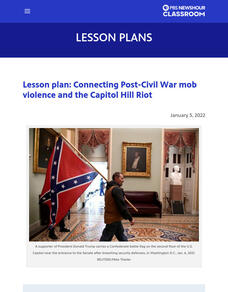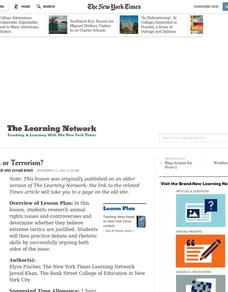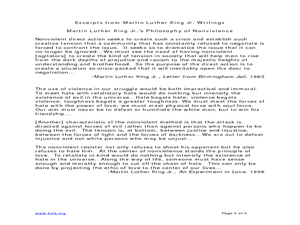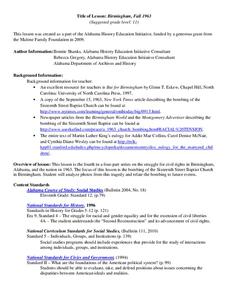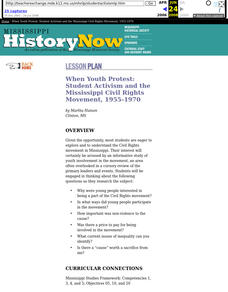K20 LEARN
The Tulsa Race Massacre
The 1921 Tulsa Race Massacre is the focus of a lesson that explores the causes and consequences of the destruction of the Greenwood section of Tulsa, Oklahoma. Pupils examine primary source images, a video clip covering the riots, and...
K20 LEARN
Oklahoma and Segregation
It was not just the states of the Deep South that practiced segregation. Young historians investigate the history of segregation and desegregation in Oklahoma. They begin by reading, annotating, and analyzing an article about the impacts...
US National Archives
Susan B. Anthony and the Struggle for Suffrage
Susan B. Anthony was willing to break the law to gain voting rights for women. Young historians investigate Anthony's willingness to go to jail to draw attention to the suffrage movement. They read and discuss primary source documents to...
PBS
Connecting Post-Civil War Mob Violence and the Capitol Hill Riot
Anti-democratic violence is not new in the United States. Learners watch videos and then compare and contrast the 1873 Colfax and the 1898 Wilmington massacres. They then watch a video about the Capitol Hill insurrection of 2021 and...
K20 LEARN
Power to the People
Black berets, black leather jackets, raised black fists, chants of "Power to the People!" These are the images that many associate with the Black Panther Party. Often forgotten are the programs the party created during the Civil Rights...
Anti-Defamation League
With All Deliberate Speed
Has the integration of U.S. schools proceeded "with all deliberate speed?" Has progress been made? Those are the questions young historians must consider as they examine the barriers to and opportunities revealed in a study of timelines...
Anti-Defamation League
Sixty Years Later
Has any progress been made in desegregating schools since 1954's Supreme Court case Brown v. Board of Education? To find out, class members examine charts and graphs representing U.S. schools' racial, ethnic, and socioeconomic...
National Endowment for the Humanities
"Sí, se puede!": Chávez, Huerta, and the UFW
"Sí, se puede!" Cesar Chavez and Dolores Huerta believed organizing farm workers and changing their working conditions were possible. Scholars examine provisions of the Bracero Program, videos, and the United Farm Workers' (UFW) work....
Curated OER
Allow Me to Demonstrate…
Learners examine the causes, actions and results of different demonstrations from around the world in modern history.
Curated OER
Activism of Terrorism
Learners research animal rights issues and controversies and determine whether they believe extreme tactics are justified. They practice debate and rhetoric skills by successfully arguing both sides of the issue.
Curated OER
Civil Rights Movement
Students identify and acquire an understanding of what the Civil Rights Movement consisted of, the issues that sparked the Movement, the people who participated and the events that occurred during the Movement. They also identify how to...
Curated OER
New Voices for African Americans
Eleventh graders study Malcolm X and black power. In this African American lesson, 11th graders write a journal entry about black power and create a timeline of the events during the civil right movement.
Curated OER
Bloody Mary Word Search
In this word search worksheet, students study the words related to Bloody Mary. Students locate the 15 words within the word search puzzle.
Curated OER
What is Equality and How Does it Affect Me?
Students explore the concept of civil rights and the ways in which Dr. Martin Luther Kind and others utilized non-violent protests to achieve their goals. They participate in a variety of discussion and role play activities during this...
Curated OER
Colonial Tea Parties
Students compare protests and points of view from two different accounts of the Boston Tea Party. They then create a flyer inviting other colonist to participate in the dumping of the tea.
Curated OER
Investigative Case - Protistan Tales of Atlantic White Cedar Swamps
Students use this WebQuest to explore the vast diversity of microbes, especially those microbes of the Atlantic Cedar Swamps. They tell a story about the protests of the Atlantic Cedar Swamp in the form of anthropomorphism.
Curated OER
Effects of the Stono Rebellion
Fourth graders learn about a slavery rebellion. In this slavery lesson, 4th graders work in groups to review different non-violent ways enslaved Africans protested slavery. Students learn about the Stono Rebellion, read a letter...
Curated OER
African Americans in California’s Heartland – The Civil Rights Era
Events related to the Civil Rights Movement in Sacramento, California during the 1960s offer class members an opportunity to compare the nonviolent resistance approach favored by Dr. Martin Luther King and the NAACP with those of the...
Curated OER
We Are The Freedom Riders
Students consider the role of the Freedom Riders. In this American Civil Rights activity, students watch videos, listen to lectures, and conduct research regarding the participants in the Freedom Ride protest. Several weblinks,...
Alabama Department of Archives and History
Birmingham, Fall 1963
Can any good come from acts of evil? The 1963 bombing of the Sixteenth Street Baptist Church in Birmingham, Alabama, and the eventual outcomes of the tragedy, are the focus of a lesson that asks groups to examine primary source documents...
Curated OER
When Youth Protest: Student Activism and the Mississippi Civil Rights Movement, 1955-1970
Students explain the meaning of the following terms associated with the modern Civil Rights movement: segregation; integration; civil rights; civil disobedience.
Curated OER
Political Protest Through Art
Students examine how artists (painters or cartoonists) use artwork as a means of disseminating a political point of view in this lesson that uses primary source documents and examples of political cartoons.
Curated OER
Just Another Lock on the Fence
Students make predictions regarding the subject of a news article, based on its title. They read the article and discuss it, answering various comprehension and thought questions.
Curated OER
Dr. Martin Luther King
In this mathematics worksheet, learners identify and define various vocabulary terms related to Dr. Martin Luther King by solving addition problems. There are nine problems to solve on the sheet.





